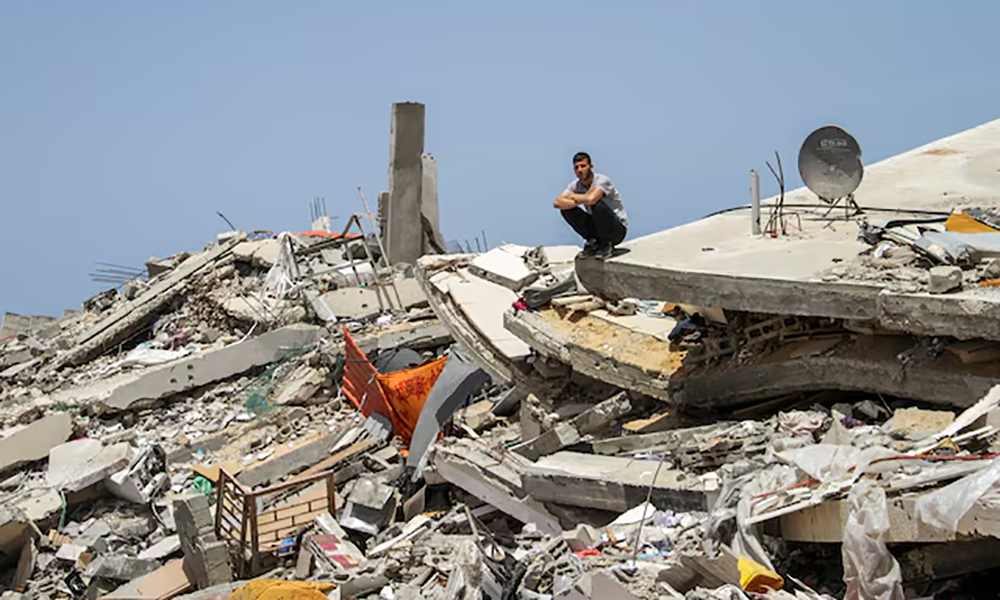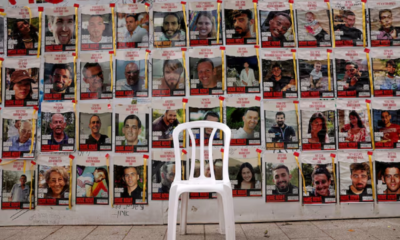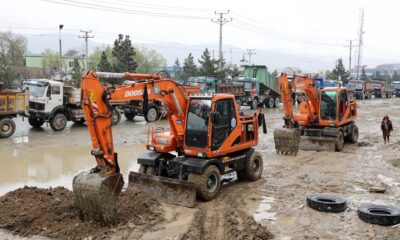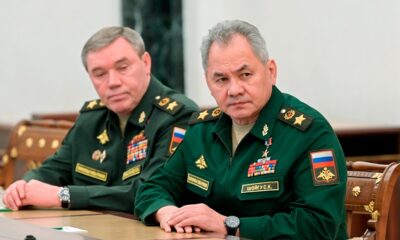Regional
Pakistan’s ex-PM Sharif seeks to wrestle back voters from foe Imran Khan

Pakistan’s three-time prime minister Nawaz Sharif heads back home on Saturday after four years of self-imposed exile in London, seeking to wrestle back support for his party three months ahead of a general election.
Sharif’s return comes as his main rival, Imran Khan, is in jail, but the cricketer-turned-politician remains popular across Pakistan following his ouster from premiership in 2022, Reuters reported.
Sharif “will need to reenergize a support base at a moment when the party’s popularity has taken big hits thanks to Imran Khan’s large vote bank,” said Michael Kugelman, South Asia Institute Director at The Wilson Center.
Sharif, who was ousted in a 1999 coup, is returning to Pakistan for the first time since leaving for London in 2019. He was serving a 14-year prison sentence after being found guilty in two corruption cases before being allowed to travel abroad for medical treatment for a limited time.
The convictions are still in force in Pakistan, but a court on Thursday barred authorities from arresting Sharif until Oct. 24, which is when he is scheduled to appear in court. His lawyer has said he will contest the convictions.
Sharif cannot run again for election or hold public office because of his convictions, even though his party has said he aims to become prime minister for a fourth time.
Khan, too, is disqualified from the elections by virtue of his conviction in August, which he has appealed.
The 73-year-old Sharif has said he was ousted at the behest of the country’s powerful military after he fell out with its top generals, who play an outsized role in the politics of the nuclear-armed South Asian nation.
He says the military then backed Khan to help him win the 2018 general election – which both Khan and the military deny.
However, the military and Khan fell out in 2022 and over the last few months the country’s top generals have been involved in a bruising showdown with Khan, which has afforded Sharif some political space.
The military denies that it interferes in politics.
“For Sharif, after the immediate euphoria of his return wears off, he will face an uphill battle. The honeymoon won’t last long,” said Kugelman.
While in exile, Sharif is said to have played a major role in Khan’s ouster and installing a coalition government led by his younger brother Shehbaz Sharif.
Khan led a relentless campaign against his removal, which helped him win huge public support especially with the coalition government caught in a crippling economic crisis that has seen record-high inflation and massive currency depreciation.
Rising living costs have become unbearable for many Pakistanis after the coalition government had to agree to harsh fiscal adjustments to resume funding from International Monetary Fund (IMF), which had suspended payments after Khan scuttled a deal in his last days in office.
Khan’s posture of defying the IMF’s stringent reforms only helped his popularity shoot up.
Sharif has had a track record of pursuing economic growth and public sector development policies. When he was removed as premier in 2017, Pakistan’s GDP growth rate was at 5.8% and inflation was hovering around just 4%.
In September, inflation registered at over 31% year-on-year, and growth is projected to be less than 2% this financial year.
Author and analyst Ayesha Siddiqa believes the economy is where Sharif will start his campaign.
“He needs a far more robust team to run the economy,” she said, but stressed: “His main task is to wipe out Imran Khan’s memory from people’s minds.”
Sharif’s arrival has kick-started a campaign for general elections slated to be held in the last week of January.
“Nawaz Sharif will revive the economy yet again,” read a banner at a train bringing supporters to a rally which he will address in eastern city of Lahore on Saturday.
Regional
China to host Hamas, Fatah for Palestinian unity talks

China will host Palestinian unity talks between Hamas and its rivals Fatah, the two groups and a Beijing-based diplomat said on Friday, a notable Chinese foray into Palestinian diplomacy amid the war in the Gaza Strip.
Hamas, which controls Gaza, is the group whose fighters stormed into Israeli towns on Oct. 7, killing 1,200 people and capturing 253 hostages. Israel has sworn to annihilate Hamas in an onslaught that has killed more than 34,000 Palestinians.
Fatah is the movement of Mahmoud Abbas, president of the Western-backed Palestinian Authority, which exercises limited self-rule in the Israeli occupied West Bank.
The two rival Palestinian factions have failed to heal their political disputes since Hamas fighters expelled Fatah from Gaza in a short war in 2007. Washington is wary of moves to reconcile the two groups, as it supports the PA but has banned Hamas as terrorists.
A Fatah official told Reuters a delegation, led by the group’s senior official Azzam Al-Ahmed, had left for China. A Hamas official said the faction’s team for the talks, led by senior Hamas official Moussa Abu Marzouk, would be flying there later on Friday.
“We support strengthening the authority of the Palestinian National Authority, and support all Palestinian factions in achieving reconciliation and increasing solidarity through dialogue and consultation,” said Chinese Foreign Ministry spokesperson Wang Wenbin at a regular briefing on Friday, without confirming the meeting.
The visit will be the first time a Hamas delegation is publicly known to have gone to China since the start of the war in Gaza. A Chinese diplomat, Wang Kejian, met Hamas chief Ismail Haniyeh in Qatar last month, according to the Chinese foreign ministry.
The Beijing-based diplomat, who had been briefed on the matter, said the talks aimed to support efforts to reconcile the two Palestinian rival groups.
China has lately demonstrated growing diplomatic influence in the Middle East, where it enjoys strong ties with Arab nations and Iran. Last year, Beijing brokered a breakthrough peace deal between longstanding regional foes Saudi Arabia and Iran.
U.S. Secretary of State Antony Blinken said he discussed with Chinese President Xi Jinping and other officials in Beijing on Friday how China can play a constructive role in global crises, including the Middle East.
Chinese officials have ramped up advocacy for the Palestinians in international forums in recent months, calling for a larger-scale Israeli-Palestinian peace conference and a specific timetable to implement a two-state solution.
In February, Beijing urged the International Court of Justice (ICJ) to give its opinion on the Israeli occupation of the Palestinian Territories, which it said was illegal.
More recently, China has been pushing for Palestine to join the United Nations, which Beijing’s top diplomat Wang Yi said last week would “rectify a prolonged historical injustice”.
(Reuters)
Regional
New UK sanctions target Iranian drone industry

Britain on Thursday announced new sanctions targeting Iran’s military drone industry, in response to Iran’s drone and missile attack on Israel earlier this month.
The measures, taken in co-ordination with the U.S. and Canada, target four businesses and two directors at a network of drone companies with the aim of limiting Iran’s ability to launch drones.
“The Iranian regime’s dangerous attack on Israel risked thousands of civilian casualties and wider escalation in the region,” British Foreign Secretary David Cameron said in a statement.
“Today the UK and our partners have sent a clear message – we will hold those responsible for Iran’s destabilising behaviour to account.”
Britain also said it would introduce new bans on the export of drone and missile components to Iran, seeking to limit its military capabilities.
Last week, Britain imposed sanctions on Iranian military figures and organisations, in another coordinated move with the United States, following Iran’s action against Israel.
Iran launched drones and fired missiles at Israel on April 13 as a retaliatory strike for the attack on its embassy compound in Damascus two weeks prior, raising the risk of further escalation in conflict in the Middle East.
(Reuters)
Regional
Turkey accuses U.S. of double standards over Gaza in rights report

Turkey on Wednesday accused the United States of having a policy of double standards on human rights, saying Washington’s annual rights report failed to reflect Israel’s assaults in Gaza, Reuters reported.
Turkey’s foreign ministry said in a statement it was deeply concerned that the U.S. report did not “duly reflect the ongoing inhumane attacks in Gaza”.
The report was prepared with “political motives, far from impartiality and objectivity”, it said, calling on Washington to cease its “double-standard policy on human rights”.
It also cited U.S. ties with the Syrian Kurdish YPG militia which Ankara deems a terrorist organisation.
Israeli forces have killed more than 34,000 Palestinians in Gaza, according to health authorities there, many of them civilians and children. The enclave has been reduced to a wasteland and extreme food shortages have prompted fears of famine.
Israel launched its assault in response to an attack by the Hamas militant group on Oct. 7 in which Israel says 1,200 people were killed. It denies allegations of deliberately causing humanitarian suffering and targeting civilians.
Turkey has denounced Israel for its campaign in Gaza and called for a ceasefire. It has also criticised Western countries for what it calls their unconditional support of Israel, read the report.
In its report, the U.S. State Department said Israel’s war against Hamas had a “significant negative impact” on the human rights situation in Israel.
On Monday, U.S. Secretary of State AntZony Blinken rejected suggestions that Washington might have double standards over Israel’s record.
-

 Latest News4 days ago
Latest News4 days agoRashid Khan named AWCC’s brand ambassador
-

 World4 days ago
World4 days agoMalaysian navy helicopters collide in mid-air, 10 killed
-

 Sport4 days ago
Sport4 days agoJaiswal ton powers Rajasthan to big IPL win
-

 World4 days ago
World4 days agoNorth Korea officials visit Iran in a rare public trip
-

 Latest News5 days ago
Latest News5 days agoAt least 1,500 families affected by recent floods: IRW
-

 Sport5 days ago
Sport5 days agoMawj Sahil player scores stunning halfway line goal in 1-0 win over Jawanan Wahedi
-

 Sport3 days ago
Sport3 days ago‘Serious talent’ Fraser-McGurk bonds with Warner to light up IPL
-

 Latest News4 days ago
Latest News4 days agoUS report cites ‘significant deterioration’ in Afghan women’s rights last year
























